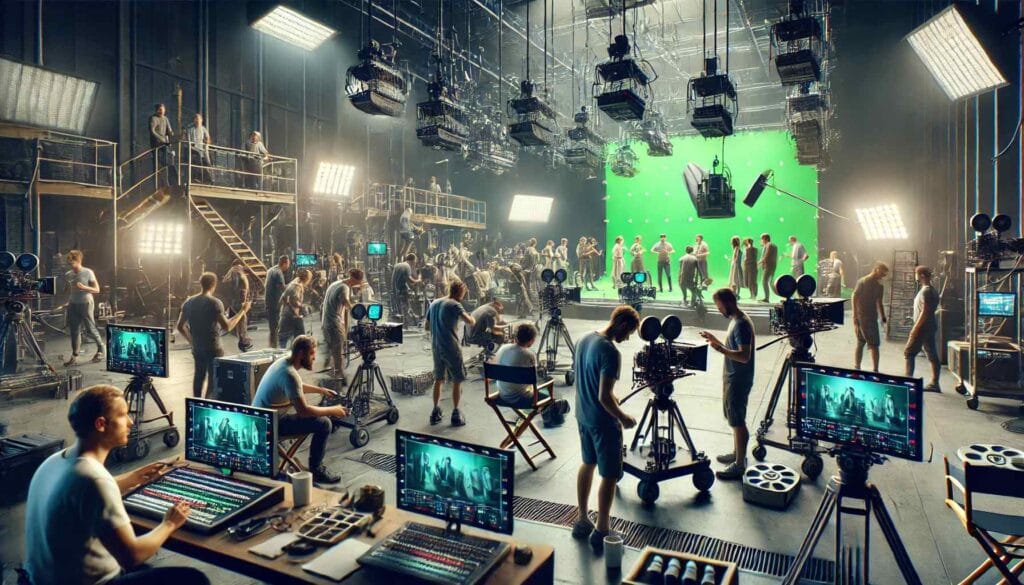The Impact of Artificial Intelligence in the Film and Television Industry

Artificial Intelligence (AI) is rapidly reshaping various industries, and the film and television sector is no exception. The integration of AI technologies in these industries has begun to transform how films and TV shows are made, distributed, and consumed. This article explores the various applications of AI in filmmaking and television production, its benefits, challenges, and the future of AI in entertainment.
1. AI in Scriptwriting and Storytelling
One of the most groundbreaking uses of AI in the film and television industry is in the development of scripts and storylines. AI algorithms can analyze vast amounts of data from previous films, audience preferences, and trends to generate story ideas, help in plot development, and even write full-length scripts. Tools like ScriptBook and OpenAI’s GPT-3 have already demonstrated AI’s potential to assist writers by providing suggestions for dialogue, character development, and plot twists. Although AI can be a powerful tool for inspiration, human creativity still plays a crucial role in shaping the narrative.
2. AI in Film Production and Filmmaking
AI technologies have also revolutionized the technical side of filmmaking. In film production, AI-powered tools are now used for automating complex tasks such as editing, color grading, visual effects, and sound design. Machine learning algorithms can analyze hours of footage and automatically identify the best shots, making the editing process faster and more efficient. AI can also assist in improving special effects, creating realistic simulations, and even generating digital actors or extras. For example, in movies like The Irishman, AI was used to digitally de-age actors, allowing filmmakers to create younger versions of characters without relying solely on makeup or prosthetics.
3. AI in Audience Targeting and Marketing
AI is also playing a significant role in film marketing and distribution. By analyzing viewer preferences, social media trends, and online behavior, AI can help studios target the right audience with personalized promotional content. This allows film and TV producers to create more tailored marketing strategies, increasing the chances of a project’s success. Netflix, for example, uses AI algorithms to recommend shows and films to viewers based on their previous viewing history, ensuring a personalized entertainment experience.
4. AI in Post-Production and Editing
In post-production, AI tools have made significant strides in simplifying tasks such as video editing, sound editing, and even dubbing. AI-driven software like Adobe Sensei can automatically identify and tag objects, scenes, and even emotions, speeding up the post-production process. Moreover, AI can assist in cleaning up audio and visual noise, making the final product more polished. AI in dubbing can also translate dialogue and match lip movements, creating a more seamless experience for international audiences.
5. AI in Enhancing Viewer Experience
AI is not just transforming the creation process; it is also enhancing the way audiences experience content. Personalized recommendations powered by AI algorithms make it easier for viewers to discover new films and TV shows based on their tastes. Additionally, AI-driven technologies like interactive storytelling and virtual reality (VR) are providing audiences with new ways to engage with content. AI also helps in creating adaptive content that changes based on user interaction, providing a dynamic and immersive experience.
6. Ethical Considerations and Challenges
Despite the numerous advantages of AI in the film and television industry, there are also ethical concerns that need to be addressed. One major concern is the potential for AI to replace human jobs, especially in roles like editing, visual effects, and scriptwriting. While AI can enhance productivity, it may lead to job displacement for some workers. Moreover, the use of AI in creating digital actors or deepfake technology raises questions about the authenticity of content and the potential for misuse.
7. The Future of AI in Film and Television
The future of AI in the entertainment industry looks promising. As AI technologies continue to evolve, we can expect even more advanced applications in filmmaking and television production. From AI-assisted directing to more immersive and interactive content experiences, the possibilities are endless. However, it is important to strike a balance between human creativity and AI’s capabilities to ensure that AI enhances, rather than replaces, the artistry behind film and television.
In conclusion, AI is already making a significant impact on the film and television industry, improving efficiency, creativity, and audience engagement. While there are challenges to address, the potential for AI to transform entertainment is immense, and it will undoubtedly play a crucial role in shaping the future of film and television.
Source : Medium.com




